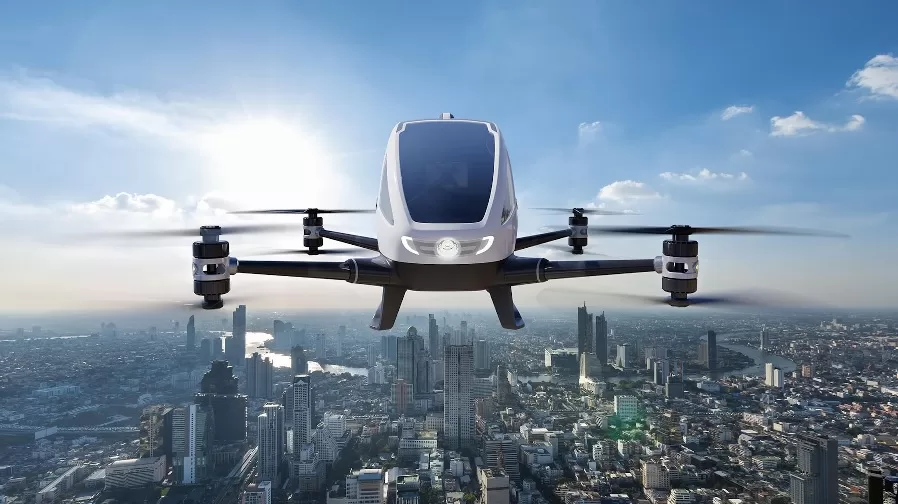Travel
Europe’s Flying Taxi Vision Faces Turbulence Amid Funding Shortfalls

- Europe’s eVTOL (electric Vertical Takeoff and Landing) sector is grappling with financial challenges and regulatory hurdles, causing delays in the flying taxi rollout.
- Companies such as Volocopter and Lilium are reducing their plans due to funding shortages and high development costs.
- Despite these setbacks, government backing, technological progress, and industry leaders like Airbus continue to drive innovation in the sector.
The concept of flying taxis flying above European cities has ignited imagination and innovation. Companies worldwide have been working tirelessly to turn electric vertical take-off and landing (eVTOL) aircraft into a reality. The potential to reduce urban congestion, cut emissions, and offer faster commutes has driven strong interest. However, despite significant technological advancements, the dream faces major financial and logistical hurdles.
eVTOL Aircraft: A New Era of Urban Mobility
Air taxis, resembling large drones, merge electric power with vertical takeoff capabilities. Leading companies, including Germany’s Volocopter and Lilium, have developed cutting-edge models like the two-seater VoloCity. These vehicles are quieter, produce fewer emissions, and have lower operating costs compared to helicopters. However, as financial challenges and regulatory obstacles emerge, early optimism is beginning to fade.
Development Costs and Regulatory Hurdles
The steep cost of designing and certifying eVTOL aircraft remains a major obstacle. Aircraft certification requires rigorous testing to meet safety standards, making the process both time-consuming and expensive. Even after certification is achieved, eVTOL companies must invest in building the necessary infrastructure to support ongoing operations.
The Funding Crunch Threatens Progress
An economic slowdown and rising interest rates have created a more cautious investment environment. For instance, Volocopter has scaled back its plans to launch passenger flights during the 2024 Paris Olympics. Due to budget constraints, the company will now focus only on demonstration flights. Lilium has faced similar financial struggles, with the company on the brink of insolvency after failing to secure a crucial loan from Germany’s development bank.
Government and Industry Support as Potential Lifelines
To sustain progress, European governments are implementing policies to foster eVTOL development, such as funding research projects and creating legal frameworks. Partnerships with established aircraft companies may also provide eVTOL startups with essential engineering expertise, resources, and supply chain support, helping to reduce costs and accelerate timelines.
Technology and Public Perception
Advancements in battery efficiency, electric propulsion, and autonomous systems are essential to making eVTOLs viable. Enhanced batteries could increase range, while improved propulsion systems may reduce noise. At the same time, autonomous flights have the potential to lower operating costs, making air taxis more affordable. Just as critical, however, is building public trust by transparently communicating safety measures and the environmental benefits of this aircraft.
Vertical Aerospace: An Exception Amidst Financial Pressures
Amidst widespread financial challenges in the industry, British manufacturer Vertical Aerospace is forging ahead with its eVTOL project. The VX4, with its innovative design and recent successful test flights, marks an exciting milestone. However, the company still faces financial hurdles. Vertical Aerospace’s future hinges on a potential $75 million investment from financier Jason Mudrick, which would require founder Stephen Fitzpatrick to relinquish control.
Lessons from Setbacks
The challenges faced by European eVTOL startups underscore the complexities of turning ambitious visions into reality. Financial stability, strategic partnerships, and flexible regulations will be crucial for building a thriving eVTOL industry. Despite the hurdles, air taxis have the potential to become a key component of urban transportation.
Airbus and US Competitors Forge Ahead
Unlike many startups, Airbus is steadily advancing with its CityAirbus NextGen, a four-seater electric aircraft backed by robust resources. Meanwhile, in the United States, companies like Joby Aviation and Archer have attracted significant investments, creating a competitive landscape that is expected to expand as the eVTOL market matures.
The Path Ahead
The vision of flying taxis is still alive, though widespread adoption remains uncertain. Despite financial and regulatory hurdles, ongoing technological advancements and new collaboration opportunities provide hope. To make flying taxis a reality, the industry will need robust support from both government and the private sector, strategic planning, and, most importantly, unwavering determination.



















































